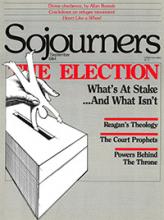This election year is a crucial time in our nation's history. And it has become an especially significant election year for us in the Christian churches. Already this year questions of faith are becoming electoral issues on a scale and with an intensity rarely seen in the whole of U.S. history. As the presidential campaign at last enters its decisive period, this phenomenon is bound to become even more significant.
The emergence of Christian faith as a campaign issue has been in large part the result of the well-publicized activities of those identified with the Christian Right. Already at least three well-funded and technically sophisticated political operations aimed at Christian voters are under way, the largest being the American Coalition for Traditional Values (ACTV) headed by Rev. Jerry Falwell and involving almost the entire roster of right-wing television preachers. Their aim is to register politically inactive Christians and get out the vote for President Reagan and other conservative candidates. The pattern is by now familiar: they urge Christians to gauge candidates by a moral yardstick that places opposition to abortion, pornography, and other legitimate moral concerns alongside support for an escalating nuclear arms race, the cutting of survival services for the poor, and military aid for the Nicaraguan contras and the Salvadoran government.
These efforts are enjoying considerable success in getting their message out through direct mail, paid television time, and subsequent coverage in the mass news media. The efforts of Falwell, along with other initiatives led by Pat Robertson and former congressman John Conlan, have become identified in the minds of many as the only politically significant expression of Christian morality and gospel values in the United States today.
Read the Full Article

